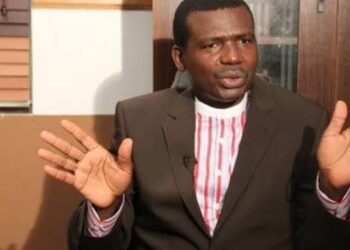I had expected the president to step out of the shadows, order his men and the teachers to return to the negotiating table with a clear deadline to resolve the issues and let our children and wards return to school. Instead, he chose to make the teachers feel guilty for their strike. Sure, the future of our future generation faces a darkening cloud but it is both unfair and irresponsible to blame the teachers. His administration bears the blame and the guilt.
Buhari walked a well-beaten track. Successive federal governments in dispute with the teachers similarly resorted to the same tactics in a fruitless search for scapegoats when they can easily find them by facing the mirror. The poor treatment of our teachers has a long history. The stress in contradictory policies in our educational system has systematically ruined it. At the last count, we had 174 universities in the country. None is a centre of excellence; none is numbered among the ranks of best universities in Africa, let alone the world. To treat the teachers as irritants because of their frequent protest strikes is arrogant, to say the least.
The teachers have been driven each time to resort to the only weapon at their disposal because each federal administration is not averse to breaching and even repudiating an agreement reached between it and the teachers. We have seen no determination on the part of the Buhari government to draw the line in the sand by taking clear and urgent steps to resolve the current strike and prevent future ones. The minister of education, Adamu Adamu, even walked out on the teachers in a negotiating session. The no-work, no-pay policy was put place in bad faith. Since this current strike began, the federal authorities have behaved in a manner that suggests they are doing the teachers a favour by keeping them on the payroll.
“There is something profoundly disturbing about the fact that every federal administration – civilian or military – has had problems with the university teachers. Their union, Academic Staff Union of Universities, ASUU, has frequently resorted to a strike action to force the government to take its responsibilities towards education – qualitative or quantitative – seriously and rise up to the challenges of rescuing the universities from degenerating into a rubbish heap as degree mills. These strike actions have had a comprehensively negative impact on academic sessions with the consequence that while you know when your child enters the university you cannot predict when he will graduate – through no fault of his.
“This is sad but the right of the teachers to use the only weapon at their disposal to force the government to listen to them is a given. The problem is not that the teachers resort to this weapon rather frequently but that the federal government, the principal proprietor of university education in the country, makes their resort to the strikes possible. Government frequently tries to dodge the issues and resort to sheer sophistry, trying to make a case before the public when it has no case in its disputes with the union. ASUU has been a victim of propaganda of outrageous proportions over the years. The government tries to portray the teachers as selfish and unpatriotic men and women who put their personal interests above national interests and those of their students.
“Unfortunately for the government, this vicious propaganda has not always washed because the truth of the pathetic condition of public universities stares us all in the face, daring us to blink. In terms of number Nigeria is the leading country in university education on the African continent. But in terms of qualitive education, the giant of Africa holds the candles to poorer African nations that take their education much more seriously than we do; and this in a century comprehensively knowledge-driven.
“The latest strike by ASUU has so far lasted for some six months. It has to do with the union’s rejection of the Integrated Personnel Payroll Information System, IPPIS, and the ill-advised insistence by the government it loses nothing by refusing to examine the merits of the argument by the teachers. Why does ASUU think that IPPIS is inimical to the university system?
The answer, according to ASUU, Biodun Ogunyemi, quoted in the Punch editorial of October 16, 2020, is this: “We challenge them to tell us anywhere in the world where IPPIS is implemented in the universities. IPPIS will shut the door against foreign scholars, contract officers and researchers that we need most dearly. We are opening new universities every day. Ask them how many competent scholars they have in the pool. They have to poach from existing universities.”
“I have not yet heard a strong argument from the government on why it insists the teachers must accept IPPIS other offering its pet idea of transparency in an increasingly opaque nation. However the crisis is resolved, it would still leave ashes in our mouths. Students would have lost six months and the academic session would not only have been disrupted but effectively thrown out of kilter. We cannot go on like this in our dear country. Something has to give. Strikes are as bad for the universities as they are for the students and their parents and guardians.
“It is not news that our educational system is rotten. Frequent strikes by teachers would not help to improve the situation. The standard government response to ASUU strikes has been uniformly inept, pathetic and even callous. Each time the teachers meet with a government team for a negotiated resolution of the crisis between them, the government team shows how utterly unprepared they are and, more importantly, what they think of the right of the teachers to make principled demands for a better university system and education on the proprietors of these institutions.
“A nation serious about its future and the future of its young people need not be persuaded that the progressive dilapidation of our universities is a national shame and one that must be arrested. While the Buhari administration is planting strange universities, it has shown a profound reluctance in curing our education of the ills that have bedevilled it for as long as anyone can remember. It is not in the nature of human societies for problems to solve themselves.
“At the retreat organised by the federal ministry of education in November 2017, the president, to paraphrase him, said that for the country to get it right, it must get education right. It was true then and it is true now. But there is no evidence the government wants to get our education right. In 1984, as military head of state, Buhari downgraded the federal universities established by President Shehu Shagari to campuses of existing universities. I find it strange that the same man is establishing federal universities when he knows that none of the existing federal universities is adequately funded, adequately staffed and adequately equipped. In national populations and political contests, numbers matter. In education, quality matters.
“As I write this, I am told that both sides agreed to a new pay roll system, University Transparency Account System, UTAS, put forward as an acceptable alternative by ASUU. If the rumours turn to truth, then by as you read this, the teachers must be returning to school. But really, is the problem of the university system the payroll system? Universities do not exist to pay salaries and allowances of its employees – academic and non-academic staff. Professor Toyin Falola, one of our shining scholarly lights, could not have put it better when he said that “University education is a system on its own. Running it is beyond just the payment of salaries or the remuneration of staff or payment of other arrears and allowances. When the university system is reduced to these routine issues, politics will creep into the education system.”“Politics, sadly, has since crept into the education system.










